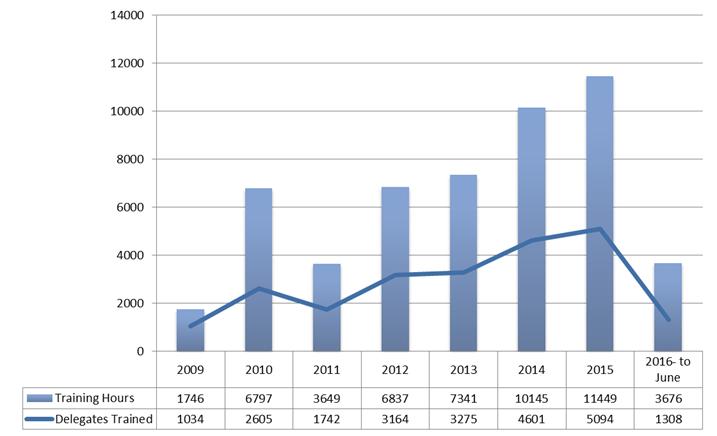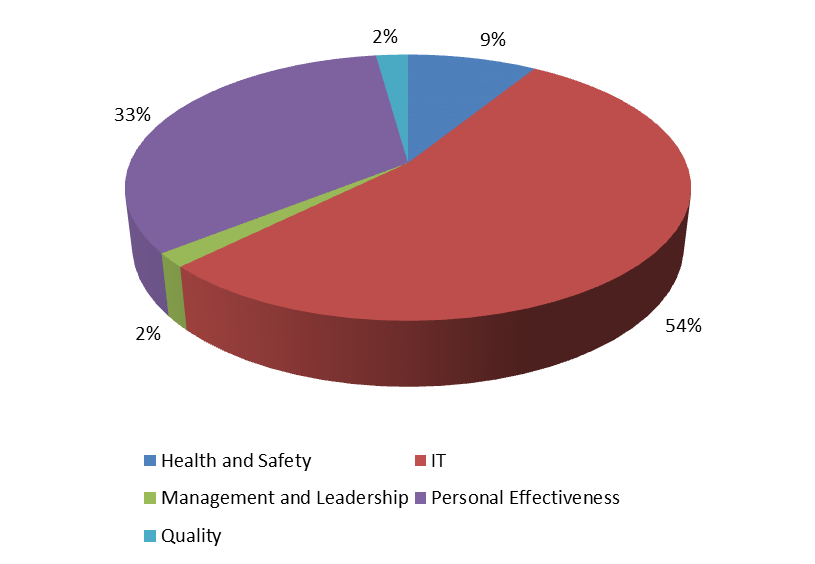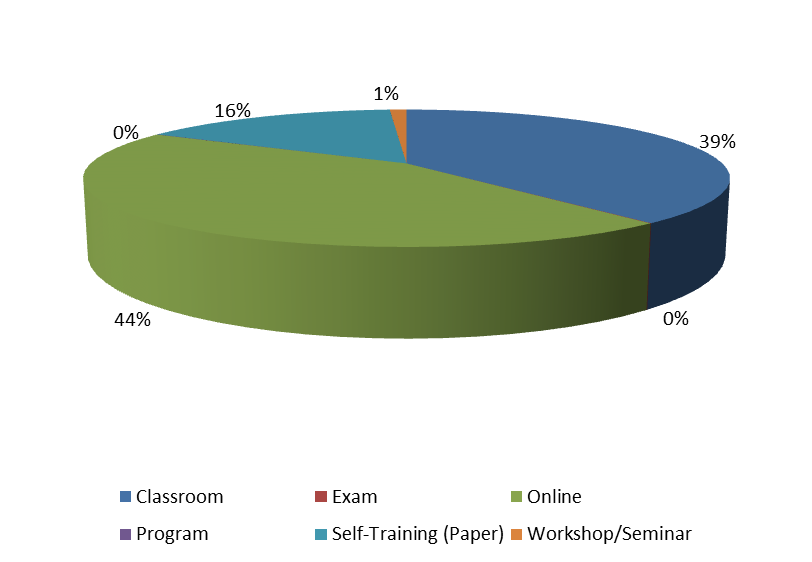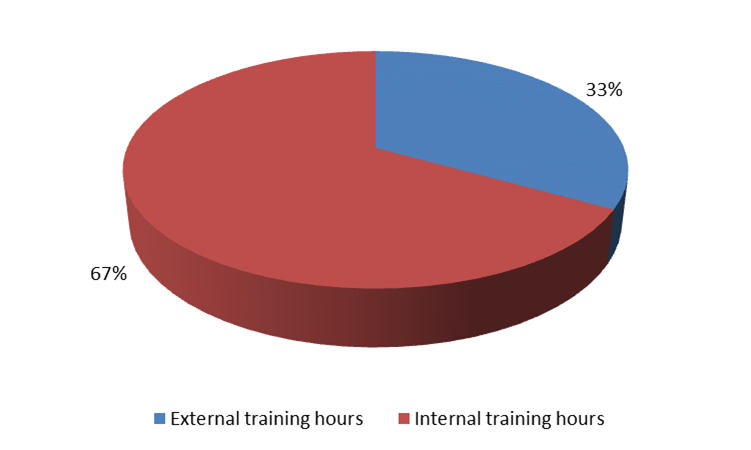
Learning & Development
Document
type: Micro-report
Author:
Elise Dumbleton, Nathan Pascutto
Publication
Date: 27/09/2016
-
Abstract
This micro-report outlines Crossrail’s approach to learning and development including internal and external training; mentoring; access to a learning and development library; work shadowing; and leadership development. The report concludes with the importance of offering a wide range of development opportunities and the benefits of offering the same opportunities to staff from partner organisations.
This micro-report would be of interest to: learning and development specialists; organisational development practitioners; human resource practitioners. -
Read the full document
Introduction & Context
Crossrail is Europe’s largest infrastructure project. The Crossrail programme involves an integrated team, the organisation formed of Crossrail Limited, the Programme Delivery Partner and the Project Partner, bringing together staff from nine different organisations.
The skills and competencies required of staff working on the programme are numerous and wide-ranging, reflecting the complex nature of the Crossrail project. Crossrail needed to take into account staff working across multiple disciplines and locations, as well as the requirement to adapt to a changing programme landscape, when providing learning & development opportunities.
Partners are responsible for the provision of learning & development specific to career development or personal development for their own staff working on the programme. Crossrail Limited, however, provides some essential training such as IT training and training to improve individual’s skills and capability required for the programme delivery. This helps to ensure that regardless of employer, people working on the programme have the required core skills to carry out their roles effectively.
The Business Case for Learning & Development
There is a strong business case for learning and development at Crossrail. At an organisational level, Crossrail’s learning and development offering ensures that they have the capacity and capability to be able to deliver the project safely, on time and on budget, and it assists in engaging, training and retaining staff.
At a macro level, a strong learning and development programme is recognised as offering benefits to the whole economy by helping to reduce labour mismatches and by delivering higher productivity and prosperity to the wider economy.
Learning & Development Policy
The Crossrail Learning & Development Policy sets out Crossrail Limited’s approach to learning and development of its staff and provides details of the learning and development process. Both the approach and process are linked closely to the Crossrail People Strategy, Crossrail’s corporate objectives, values, and performance management system.
Crossrail’s Learning & Development Policy requires that:
- All employees must be suitably skilled and competent to carry out their role
- Learning and development opportunities are in place to equip employees with the skills, knowledge, experience and behaviours required to deliver their role
- Health and safety training is available to all individuals who require it and is mandatory for particular roles
Learning and development activities are available to Crossrail Limited staff, and also available to Partner staff to ensure that those staff are in a position to provide the required level of support to deliver the project.
Identifying Development Needs
Crossrail operates a formal performance management process. As part of the annual performance management cycle, staff and their line managers identify development needs and complete a development plan which outlines their development objectives over the performance management cycle (one year).
Crossrail outlines the required skill competencies for staff from the integrated team in job descriptions, ensuring that staff are aware of the expected competencies and skills for their particular role.
As part of Crossrail’s performance management framework, staff complete competency assessments during the performance management process. Staff are provided with a competency framework where they can assess their competency across the key themes of health & safety; leadership; finance; environment; and risk. Staff can then identify any competency gaps and work with their line manager to agree a development plan for improvement.
Staff are ultimately accountable for their own development. Line managers are responsible for helping staff to identify development needs and ensuring that they are given the time to complete their required development and following up on the commitment in regular one-to-ones and as part of the performance management process.
Learning & Development Offering
The nature of the Crossrail project means that the workforce is required to have a high-level of technical expertise to carry out their roles effectively. The varied nature of the technical expertise required means that offering a “one size fits all” training approach is not appropriate. Crossrail therefore offers a variety of development opportunities to its staff including: internally designed and delivered training; externally delivered training; mentoring; a work shadowing scheme; and access to a learning & development library.
Internal training
Crossrail’s Organisational Effectiveness team and subject matter experts from the integrated team design and deliver internal training in-house. The courses designed and delivered cover a wide subject area including training in: health & safety; IT; personal effectiveness; management; leadership; and quality.
The courses and content focus on giving individuals the core knowledge and competency that they need to perform their role at Crossrail effectively. This core internal training offering is supplemented with additional courses targeted at addressing particular issues such as personal effectiveness and organisational change.
The internal training offered throughout the majority of the programme was largely classroom based and supported with limited e-learning. As the Crossrail programme moves towards completion, there has been a shift to e-learning to ensure that knowledge and key development capability is maintained as subject matter experts leave the programme.
Internal training opportunities are booked onto via a learning management system which is managed by the Organisational Effectiveness Team. The learning management system assists with the management and communication to delegates and provides an auditable record of training completed by staff. In addition, the learning management system also assists with resource planning of trainers and training facilities. At the beginning of the project, a learning management system was not used making it more difficult to track learner progress and progression. Learning management would have been improved if this was implemented at the beginning of the project.
In response to succession planning, Crossrail has developed in-house, two levels of leadership development programmes which aim to accelerate the development of high potential individuals. Further information is in the Leadership Development Programme micro-report.
External training
External training is an important part of individual personal and professional development at Crossrail. Although Crossrail is a finite organisation and will come to an end, it was considered that staff joining Crossrail Limited should not have fewer personal and professional development opportunities than if they had joined another organisation which operated on an ongoing basis.
External training opportunities are offered to Crossrail Limited staff that require additional training or qualifications which are not part of the core internal training course offering. The external training offering is generally training for which Crossrail does not have the subject matter expertise to deliver or which is not viable for Crossrail to deliver in house.
The Organisational Effectiveness team receives an annual budget for staff development as part of the annual business plan process. This budget was allocated across the organisation; following directorate training needs analysis meetings with each director as part of the performance management process.
Crossrail’s Learning & Development Policy outlines strong governance arrangements, including financial accountability to ensure Crossrail was able to make the best use of available resources. Crossrail Limited staff are able to request external training through the submittal of a training request form which requires the approval of the delegate’s line manager, the Head of Organisational Effectiveness and in some cases the functional director.
In 2014, it was decided that the procurement of the majority of external training would be outsourced to a third party company instead of being managed in-house. This approach provided Crossrail’s learning and development offering strategic and operational resilience. It has also freed resourcing to support the internal development opportunities offered.
Additional development opportunities
Crossrail offers all staff from the integrated team a mentoring and coaching scheme, a work shadowing scheme; Continuing Professional Development (CPD); and access to a learning & development library
Mentoring and Coaching Programme
The mentoring and coaching scheme is available to staff to join as either a mentor or a mentee and offers the opportunity to gain career guidance, seek advice and learn from other people’s experiences.
The Mentoring and Coaching Programme is open to any member of the integrated team to join as either a mentor or a mentee and allows knowledge and expertise to be shared across the integrated team. It was hoped that this would lead to improved understanding of roles and improved collaboration across the team demonstrating that there are clear benefits in embedding effective learning and development process across an integrated team. The programme has received positive feedback from mentors and mentees.
“I found the mentoring programme very useful. I joined the programme because I wanted to learn about what other people were doing in Crossrail and broaden my experience within the industry.”
Crossrail Mentor and Coaching Programme Mentee
Work Shadowing Scheme
Implemented in 2015, the work shadowing scheme is a programme that allows staff to gain an understanding of other roles in the business. Unlike mentoring, this provides opportunity to observe a colleague at work in order to gain a better understanding of their specific job role.
Continuing Professional Development (CPD)
Crossrail funds CPD and qualifications in order to support Crossrail staff in their professional development. CPD arrangements for Partner staff are the responsibility of individual employers.
Learning & Development Library
Crossrail offers staff from the integrated team access to a learning & development library. The library is administered by the Organisational Effectiveness team and includes resources to support staff with their learning & development objectives covering topics such as: change management, culture, leadership, diversity, project management, finance, and health & safety
Learning & Development and the Integrated Team
To ensure consistent behaviours and to foster a sense of collaboration, development opportunities are offered to all staff in the integrated team. Examples of development opportunities which have taken place across the integrated team are unconscious bias and diversity awareness training, the latter of which was mandatory for all staff from the integrated team.
Supporting Demobilisation through Learning & Development
As a time-limited organisation, the headcount profile of the integrated team will reduce as the Crossrail programme nears completion. The learning & development team and the wider Organisational Effectiveness and Human Resources team has an important role to support the organisation through this change.
To assist managing this change, Crossrail developed and delivered the Career Management for Managers course to equip line managers with the information they need to facilitate change within their teams. Similarly, an internally developed Managing Your Career course is offered to Crossrail Limited staff whose roles were coming to an end to help provide them with the skills to secure their next role beyond the Crossrail project.
Partners are responsible for developing and delivering career management courses for their staff.
Measuring Learning & Development Delivery Performance
The effectiveness of learning and development is measured for each course delivered by the internal Organisational Effectiveness team. At a minimum, delegates are asked to complete an evaluation form at the end of the course to assess competency uplift, course content and trainer delivery.
Training metrics are actively monitored and reported periodically as part of a training dashboard. This provides information on training performance and helps to focus on training areas which could be improved. Key metrics include:
- Delegates trained
- Total hours delivered
- Training delivered by course
- Competency uplift
Key performance outcomes from the Crossrail learning and development offering (as at June 2016) includes:
- Over 58,200 internal development hours delivered since 2009, with average year-on-year growth of 47 per cent over the 2009 – 2015 period. Internal development increased in line with the headcount of the integrated team
Figure 1 – Internal Training Hours Delivered between 2009 and June 2016
- Over 85% of training delivered was for IT training or personal effectiveness
Figure 2 – Training by Category — 2009 to June 2016
- 44% of training is delivered online, with 38% in the classroom and 16% self training. Online training will increase as a proportion in the final stage of the project as classroom based training is migrated to e-learning.
Figure 3 – Internal Training Delivery Method — 2009 to June 2016
- External training, managed through an external third party contract, accounted for 33% of all training delivered since the contract was implemented in 2014
Figure 4- Internal-External Training Split (from 2015/16), following introduction of a managed learning service provider
- 1,050 delegates trained in diversity awareness in 2015/16 as part of Crossrail’s focus on the Respect value
Lessons Learned
- A progressive learning and development strategy for a time limited organisation means that staff behaviours are aligned and people feel part of the same team, regardless of their employer.
- Having a variety of development available makes it easier for staff to choose development which they can complete whilst managing other work priorities.
- Having a flexible learning & development offering, with appropriate governance in place, ensures that you can quickly respond to requirements as they are needed and when they change.
- Training budgets need to be carefully managed. It is critical to prioritise training requests and ensure that they are supported by a business case to achieve value for money.
- Accurate record keeping is important. This made tracking staff development easier and means that there is a single repository for staff training information. Staff benefit from being able to book onto internal training without restriction. However, it was a challenge to optimise attendance to courses.
Recommendations for Future Projects
- Make sure that a wide range of development is offered to ensure that skilled and suitably engaged people experience the advantages of joining a project.
- Establish clear record keeping and reporting processes, preferably electronic upfront and make sure that the process can adapt to the changing needs of the organisation.
- Consider offering the same development opportunities, including induction to staff from partner companies in order to align behaviours and create a collaborative environment.
- Implement a Learning Development Policy, including a clear governance framework for managing training budgets to ensure value for money.
-
Document Links
-
Authors
Elise Dumbleton - Crossrail Ltd
Elise Dumbleton is the Learning & Organisational Development Specialist at Crossrail. Elise’s responsibilities include induction, personal effectiveness training and performance management. Elise joined Crossrail in March 2015 having previously worked in Learning & Development for several years.
Nathan Pascutto
Nathan Pascutto was the Business and Policy Manager for Talent & Resources at Crossrail from 2014 until 2018. Prior to joining the Crossrail project, Nathan held senior policy positions across both the Australian and UK Governments, including the Department of Finance, and the Treasury in Australia; and the Department for Education; and the Department for Energy and Climate Change in the UK.
Nathan has a Bachelor of Business and a Bachelor of Laws from Southern Cross University, Australia, and a Graduate Diploma of Legal Practice from the Australian National University.





